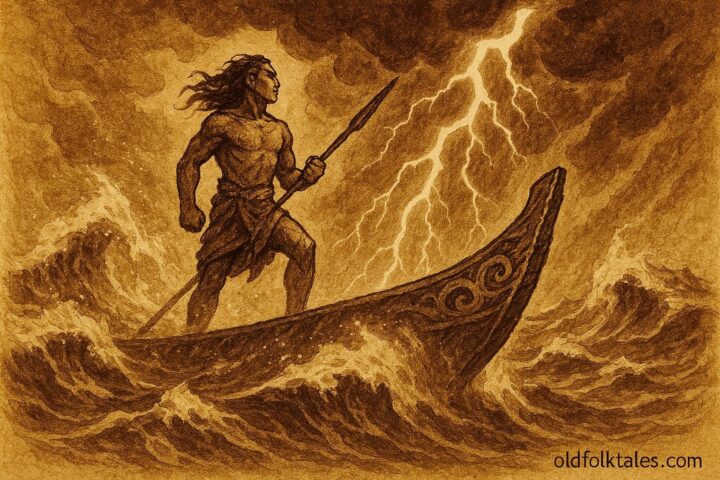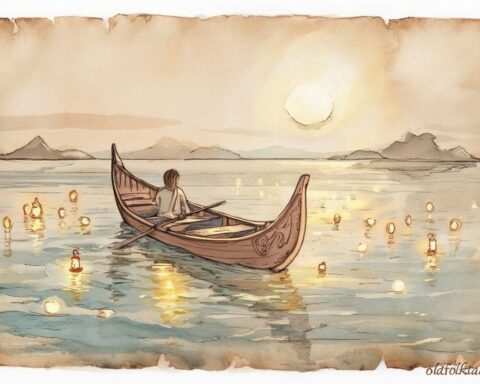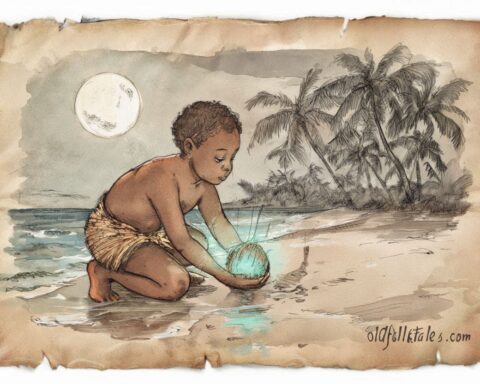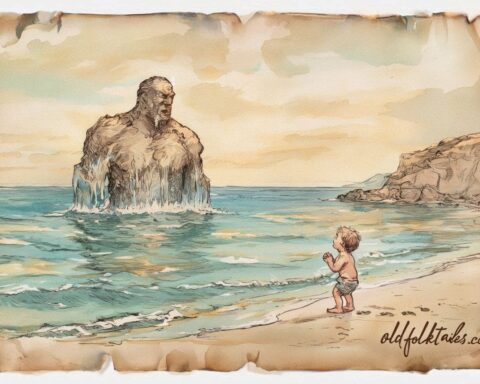Long before the coasts of Papua New Guinea knew the sound of steel or the glow of lamps, the people of the Sepik River cooked with nothing but the sun’s patience. They ate their food raw, shivered through the rain, and watched lightning strike far off in the jungle.
“Fire belongs to the sky,” the elders said, “and to the spirits who swim beneath it.”
But one young man, Maro, could not accept that fate. He watched the cold take his mother’s warmth one stormy season and swore the river spirits were selfish. “We offer fish, we offer song,” he said to the water, “yet you never share your fire.”
That night, as the river lay black and still, a shape rose from its surface—a long dark back, teeth gleaming like wet stones. It was N’gala, the Crocodile Spirit, ancient keeper of fire. Smoke coiled from its nostrils; its eyes glowed like buried embers.
“Fire is not yours to hold,” it rumbled. “Men are careless. They would burn the forest and forget to thank it.”
Maro bowed low. “Then let me prove you wrong. Give me one flame. If I waste it, you may take me.”
The crocodile watched him with smoke curling between its teeth. “Very well. But you will earn it with courage, not words. Deep within my den burns a stone of flame. Bring it to the surface, and fire will belong to your people. Fail, and your name will sink with the tide.”
Maro dove. The water was cold enough to steal breath and thought, but he followed the crocodile’s shadow until it vanished into a cave beneath the riverbank. Inside, he saw a faint red glow—the heartstone of N’gala.
He reached for it, but as his fingers brushed the heat, the water turned to steam. Pain blazed through his body. The crocodile’s voice thundered: “You cannot take fire; you must become fire.”
The spirit lunged, jaws closing around him. Villagers on the shore saw the river erupt in bubbles and light, and they mourned him as lost.
But at dawn, the crocodile climbed the bank. On its back lay Maro, alive but changed—his skin marked with scales of dark gold, his eyes burning faintly like coals.
In his hand he carried a single spark cupped between two shells. “Fire,” he said hoarsely, “given, not stolen.”
He placed it on dry wood, and it caught. Flames rose, orange and warm, painting faces that had only known gray light. The people danced and wept, feeding it with thanks and palm leaves.
When they looked again, the crocodile was gone. Only a deep trail in the mud remained, leading back to the river.
From that day, the Sepik people built their hearths in the shape of a crocodile’s jaw, with two stones at the mouth and a hollow for the flame. They say when the fire crackles low, it is N’gala breathing softly, reminding them:
“Keep it sacred. Fire burns brightest for those who feed it with gratitude.”
Moral of the Story
Power without respect consumes its holder. The gifts of nature demand care, not conquest.
Knowledge Check
1. Who originally owned fire?
The Crocodile Spirit, N’gala, guardian of flame beneath the river.
2. What drove Maro to seek fire?
His mother’s death from cold and his desire to help his people survive.
3. What test did N’gala give Maro?
To dive into the spirit’s underwater den and bring back the flaming heartstone.
4. How did Maro change during his trial?
He was touched by fire’s essence—his skin marked, his eyes glowing with heat.
5. What did the people build in memory of the spirit?
Their hearths shaped like a crocodile’s jaws, to honor N’gala’s gift.
6. What lesson does the tale teach?
That true mastery of nature begins with reverence for it.
Origin: Sepik River, Papua New Guinea (Melanesian oral tradition)






